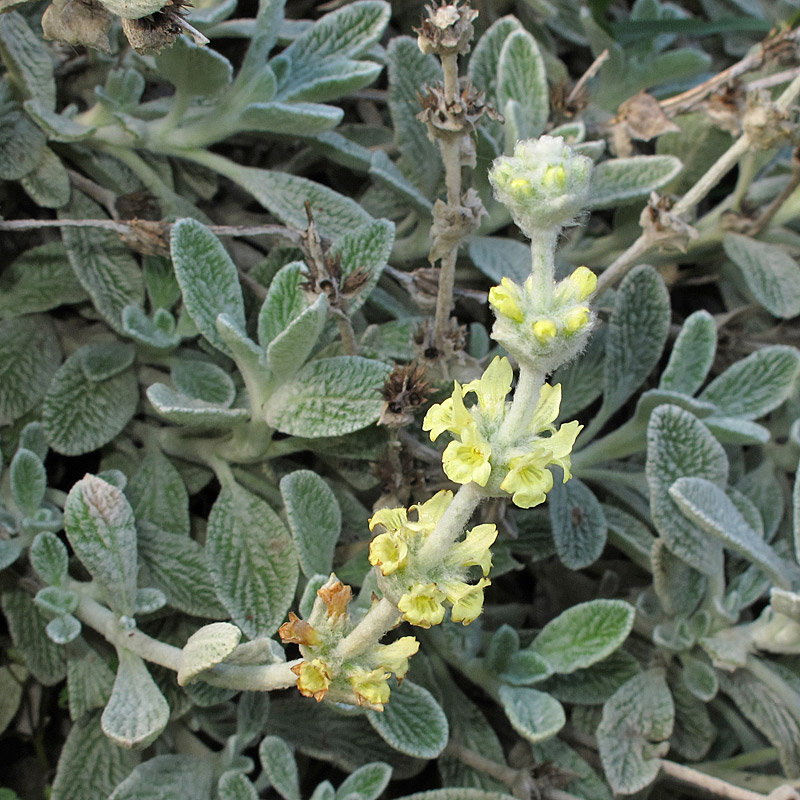Botanical name
The genus Sideritis — ironwort — includes several species native to the mountainous areas of Greece and the southern Balkan Peninsula, whose flowering herb is traded as ‘Greek mountain tea’. In some cases, no German names are known for these species.
Sideritis scardica Griseb.
Sideritis clandestina (Bory & Chaub.) Hayek
Sideritis raeseri Boiss. & Heldr.
Sideritis syriaca L.
Family
Lamiaceae
Common name
Greek mountain tea, Shepherd’s tea
Information about the plant
The genus name Sideritis is based on the Greek ‘sideros’ (= iron) and refers to plants mentioned by Pliny in several places as remedies for wounds caused by iron weapons. This is probably the reason for the name ‘Greek ironwort’ used in some books.
The four Sidertitis species listed above are annual to perennial herbaceous plants or small shrubs with linear-lanceolate, often grey-haired stem leaves. The lip-shaped flowers, usually yellow, are arranged in false whorls. They have a five-toothed calyx, often with a thorny awn. The flowers are clearly two-lipped: the upper lip is two-lobed, and the lower lip is three-lobed, usually with a large, edged central lobe. Balkan ironwort (Sideritis scardica) is also cultivated as a field crop.
Ironwort has an aromatic odor due to the essential oil contained in the herb. It is found in glandular scales on the leaf surface and is released when these glands are damaged by rubbing.
Medicinally used parts of plants (herbal drug)
The dried, flowering stems with attached leaves (ironwort, Greek mountain tea - Sideritis herba), with their spicy aroma from the essential oil contained in the drug, are used.
The commercially available drug is sourced from the southern Balkans.
Constituents of the herbal drug
Ironwort contains essential oil with mono- and sesquiterpenes, as well as diterpenes, triterpenes, flavonoids, phenylethanoids, and phenolic acids.
Quality of the drug
No pharmacopoeia quality description is available for Sideritis herba (Greek mountain tea).
Medical applications
Recognised medical use
The HMPC has classified ironwort (Greek mountain tea) as a traditional herbal medicinal product (see ‘Traditional use’).
ESCOP: Ironwort has not yet been evaluated.
Traditional use
Ironwort (Greek mountain tea) has been classified by the HMPC as a traditional herbal medicinal product (Article 16a of Directive 2001/83/EC). Based upon long-standing use, ironwort can be used for coughs caused by colds and for mild gastrointestinal complaints.
Herbal drug preparations in finished dosage forms
- Cut ironwort (Greek mountain tea) for tea preparation, also in mixtures with other herbal drugs.
Dosage
Finished medicinal product: not available.
Tea infusion: Drink 1 cup of freshly prepared ironwort (Greek mountain tea) 2 to 3 times daily (also in mixtures with other herbal drugs such as cough and bronchial tea); daily dose: up to 12 g of the drug.
Preparation of a tea
Pour 150 ml of hot water over 2 to 4 g of chopped ironwort (Greek mountain tea) (do not boil!), stand for 10 minutes, and strain.
Notes
No safety studies are available on the use of ironwort (Greek mountain tea) during pregnancy and lactation. The use in children and adolescents under the age of 18 is not recommended due to a lack of evidence.
Side effects
None known.
Interactions
None known.


